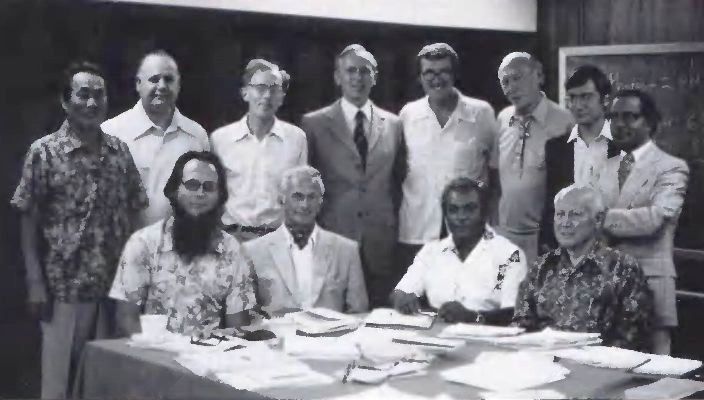![]()
The Words of the Lewis Family
|
|
The Words of the Lewis Family |

Board
of Trustees, Global Congress of the World's Religions. Left to right
(back row): David S.C. Kim, Isma'il R. al Faruqi, Marcus Braybrooke,
Francis Clark, Henry 0. Thompson, Marcus Bach, Kurt Johnson, K.L.
Seshagiri Rao (front row): Warren Lewis, Jan Knappert, David
Kalupahana, Archie Bahm.
The flowing together of human energies in the life of our time inspires us religious people to unify our hearts, clarify our understanding, implement our compassion, and coordinate our action in the shared responsibility for well-being of the human family and the earth itself on which we live.
This task belongs to all of us as the history of our race increasingly becomes a common story, but it is particularly expected of those whose minds have been opened to spiritual enlightenment and whose hearts are made tender for the fragile and the suffering.
We, therefore, today, November 30th, 1980, sensing our religious responsibility, in the name of all we hold sacred constitute ourselves a global congress of the world's religions.
We undersign our names -- both those who call on God and those who do, not -- and invite others of like persuasion to join with us and sign their names, betokening our intention to gather the world's religions into an on-going congress where these high purposes shall be acknowledged, strengthened and made effective.
The movement to call the world's religions into a Global Congress began four years ago, at the time of the ICUS meeting in San Francisco and has continued in subsequent gatherings at Barrytown, Bristol, Boston, Los Angeles and on Kauai, Hawaii.
Under the inspiration of Reverend Moon, Dr. Warren Lewis, a professor at Unification Theological Seminary at Barrytown, spearheaded the gathering of people of all major world religions and some indigenous religions in these various meetings, trying to formulate a structure, statement of objectives and articles of incorporation for such a global congress.
This proposed congress is not seen as a new religion, a syncretism of existing religions, a legislative body or an ecumenical council; it is rather an association of religiously-motivated persons proposing to take religious action, guided by the consensus of those who wish to participate. It is intended to be a forum where individuals of all religious persuasions can meet, discuss and clarify issues and move towards resolution and coordinated action.
In the four conferences towards the formation of such a global congress, people of all major religions participated. The independent Board of' Trustees, constituted early in 1980, includes scholars or ecumenists of Buddhism, Hinduism, Islam, Judaism, Christianity and various new age movements, as well as representatives of indigenous religions of Africa and Asia. Funding for the initial conferences was provided through the Unification Theological Seminary, but the Board of Trustees is soliciting funding for future activities, which will include regional consultations in Africa and Asia this year. By 1983, organizers hope to convene a first plenary session.
Approximately 150 ecumenists and theologians were involved in the planning sessions, and a similar number attended the inaugural meeting of the Global Congress in Miami on November 30 and signed the preamble which appears above.
Much has been proposed, and some is beginning to come to pass. The African Institute for Humanistic Values was founded partly through the help of the Global Congress and will be soon inaugurated in Togo. The two regional consultations scheduled this year will begin to bring the Global Congress in direct contact with the wide world of religions. The Congress itself could thereafter be both an on-going forum for discussion and debate of humanity's needs as well as an occasion for application of religious perspectives in the work of alleviating those needs. The Global Congress would also be a time of mutual appreciation and celebration of the complementarity of one another's spiritual wealth.